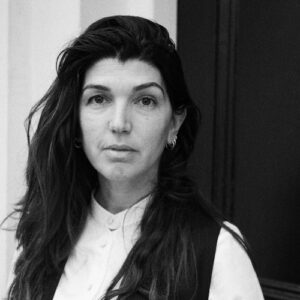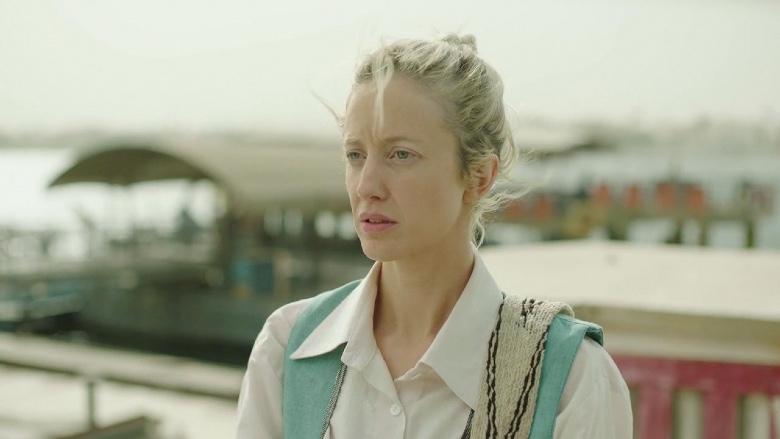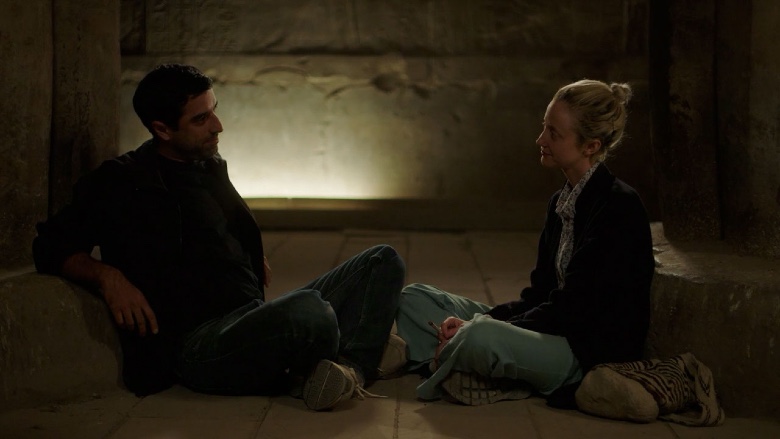
It’s a frequently-used cliché by filmmakers to state that their filming locations are like a character in their movie. For Zeina Durra’s Luxor, no truer statement could be made, because as the title suggests, she filmed the entire movie in Egypt.
It stars Andrea Riseborough as Hana, a British aid worker spending some alone time in the city of Luxor, Egypt, when she meets archeologist Sultan (Karim Saleh), a former lover from when they both were younger. Over the next few days, Hana spends time alone and with Sultan as she tries to come to terms with past decisions.
Luxor is a fascinating second film from Durra, who previously directed the feature, The Imperialists Are Still Alive! in 2010, and the short Seventh Dog five years earlier. Besides having a fine leading actor in Riseborough, the London-based Durra put together a fantastic team and mostly-Egyptian crew to capture some of Luxor’s gorgeous sights as well as some of its glamorous hotels. The cinematography by Zelmira Gainza is to die for, and the score by Nascuy Linares would be enjoyable even without what it brings to the visuals.
Below the Line spoke with Ms. Durra a few weeks back over the phone.
Below the Line: I know you made a previous feature and a short, so what was your background before getting into film? Did you go to film school?
Zeina Durra: I did the MFA in film at Tisch at NYU Graduate School, so that was my background. I went very young at 22.
BTL: After doing your first feature, what led you to make Luxor in Egypt?
Durra: I got married after I made my first feature. I lived in New York for a very long time, and basically, all of my support group were out there, all my NYU friends and people I’d met making films with, the labs, everything. I moved to London, and I found it really difficult, because my whole like nest was over there. I then had some children, and I had all these problems. I had all these films that I was supposed to be making, but it’s difficult when you have to restart somewhere else. Even though I’m from here, I left very young, over a decade, so it took me a while, and then I had this film coming together with this wonderful, very well-known British producer, and then it just sort of stopped. He told me, you’ve got to find another film before this, and we can make this one you really want to make.

That night I went to bed, and I was so down, because it was greenlit, I was gonna be amazing. I was super down, and then I had this dream of this woman walking in Luxor, and then the next day, I was speaking to a cinematographer who I know, who’s an old friend. She was also at Tisch, but she did an undergrad at the same place as me. We know each other from London. We were talking about the movie, and this is why I miss New York — she was in New York at the time — and I was talking to her about this dream I’d had, and I how I thought it would be a really good film, and we were unpacking it together. She was helping me like a sounding board for this idea I had. She said, “I think it sounds excellent, I’ll shoot it for you.” I said, “Would you shoot it for nothing? We’ll go out there,” and she said, “Yes, I’ll do it. It sounds amazing.”
Then I called up this Egyptian producer I know, and he was randomly in London, because of the London Film Festival. Literally, this film just happened so quickly and so easily, which is unlike anything I’ve ever done before. He was literally down the road, so I had a coffee with him that day. I showed him a page of notes I’d written, and I said we’d want to make it for as little money as possible, super guerilla crew. I knew that was difficult in Egypt, though, because they have a massive, very over-bloated film industry where the wardrobe department has like seven tailors. There’s a lot of things going on, so I felt, “Oh, God, that’s going to be quite difficult.” I explained to him that I wanted it to be really, really small. It was still big, but we got it to be as small as it can be in an Egyptian setting, because obviously, there’s a lot of hierarchy. It’s really funny, like, “No, I can’t go and get that. My assistant has to go and get that.” It was very much like that.
We had as small a set as we could, and all we went out there basically and made the film. It was funded by this Egyptian producer and some British money for development. It would have happened even faster had I not gotten pregnant with my third child. Three months after it got greenlit, we were about to make it but then we just couldn’t because it would be a bit dangerous for me to shoot it at six or seven months in the heat. We chose to wait until the baby was born, and then with my baby who was three months, I went out and started shooting.
BTL: Had you been to Luxor before? That would have been very random to dream about a place you’d never been.
Durra: Yes, I had been there when I was a teenager, like a young, young teenager, kind of 12-ish, 13, sort of age. I’d been there before, but I hadn’t for a while, but someone was talking about it, something about the place.
BTL: You spoke about the hierarchy of how the film industry works there, so did you mostly have Egyptian department heads?
Durra: Yes, I had. My Egyptian producer is like the best Egyptian producer. All his films go to Cannes, and he’s had stuff at Venice and Berlin, mine was at Sundance. He’s like the really high-end arthouse, but he also does things for Netflix. He has a new show that’s on Netflix now that was made in Egypt. He’s just brilliant. He knew exactly how to do it, so he got me the best people to meet, and then my DP brought a gaffer from New York. We discussed that, as that was our main expense. She brought this gaffer from New York, and then there was an Egyptian gaffer. They managed to communicate with each other so that the Egyptian gaffer could tell the team what to do so, because they all spoke in Arabic. It was really successful, actually, and then the rest of the department heads were all Egyptian.

It’s an amazing film industry, because literally, the doggy track was put down sometimes in 15 minutes, and it was perfect, because they do it so much. It’s basically the center of the film industry for the Middle East and North Africa, so all the soaps, everything’s made out of there – the films, the soaps, you name it. As a result, they are so fast and so brilliant.
BTL: That’s interesting to hear because I don’t feel like I’ve seen a lot of Egyptian films or shows get to the States, like they’re somewhat isolated from the American industry.
Durra: Well, no, they’re not isolated. Only with America, but their stuff is sold to Mexico and all over the world. It’s just for Americans perhaps, but if you see the world through the eyes of America, then yes, but if you see the world through the eyes of everywhere else, Egyptian stuff is like everywhere, which is what’s so interesting. They are really well known. What’s really beautiful is that if you see the films from the 1950s, because Alexandria and Italy had such tight links, there were a lot of Italians, historically, had been living in Alexandria. You also have amazing Italian cinematographers, and so you have these beautiful films. Egyptian cinema made in the ‘50s that look like a Fellini movie, because it’s a combination of Egyptian directors with Italian photographers. It’s really amazing.
BTL: How was it filming in locations there? Did you have to get permits for everything, because you mentioned doing it guerilla style.
Durra: Yes, the cool thing was that it was permits for everything, because there, you don’t want to mess with anyone. You had to get permits, but because it was an Egyptian film, it was kinder to us then if we were a big Hollywood movie, because they knew we didn’t have any money. We managed to get all the permits for the most beautiful places, partially because my producer, Mohamed Hefzy, is also the President of the Cairo Film Festival. He’s really respected there, and he’s the kind of guy you see on TV talking about film there. He’s a bit of a celeb in his own right. They love him there, and they gave us all the permits. It was all done very well and perfectly, and it was great.
BTL: Did that also include shooting in the hotels? I know a lot of hotels can be weird about films being shot in them.
Durra: Oh, my God. That was so intense. We got it, because our producers know Sofitel, who own it, but we couldn’t lock the locations down, so we just had to be like, “Hey, we’re shooting,” and then if someone came on, sometimes they’d look into the camera. We tried to get them before they came onto camera. It was kind of intense. [Laughs] It was guerilla style, but with permits. It was guerilla style because we could not lock it down, but we had the permits to film everywhere. Does that make sense?
BTL: What was involved with production design for the movie since it’s mostly real locations? Was there a lot of having to build things or any set decorating involved?
Durra: No, zero. We had no time. We shot in 18 days. I realized that I’m super esthetic. My Production Designer from Imperialists is brilliant. I’m really obsessed – she’s called Jade Healy. She’s done wonderful films since my first film. I think my film was one of her first or second features. She’s gone on to do a lot of Oscar-nominated movies – forget Oscars, just really good movies. I’m obsessed by production design, but part of the reason it was so doable to do a beautiful film for nothing out there was that we managed to use the natural light and the locations. That was a real gift, because the digs were all real. The archeologists opened that dig up for us, which is her old dig, and I knew her through a mutual friend from New York. I really lucked out in a sense with the access that we had. Obviously, like with the bar, for example, we had to swap out the lights and things like that. We changed a lot of the practicals, I remember that, and we’d put gels in certain places, but it was still an open set most of the time, except for in the rooms. Inside the rooms obviously it wasn’t, because they were our rooms that we had rented from the hotel, and they allowed us to shoot in [them], but when you look at the wide shots, none of that was closed.

BTL: There isn’t much tourism now but I’m sure the tourist board must love this movie, because literally anyone who watches it probably thinks they have to go there.
Durro: Exactly. It’s so funny, because a lot of people say to me, like a radio host said the other day, that after watching the film, she looked for tickets for Luxor. When I first went out to location scout, there was no one there, because the war with Syria was in a pretty bad situation, and there were problems on some of the borders. Everyone was a bit worried, so there was no one there. When I went back a year later to shoot – I’d already been there in March when there were no tourists – I’d gone back twice before in the year 2018 to location scout. By the time I’d gone back in 2019, which is only about five or six months after I had been there before, it was a bit more busy, which was annoying for me, but it was great for Luxor, because you want it to be busy since people there really rely on tourism. But the hotel was still pretty chill. There was not that many people there. It was very quiet, because the people go out to see all the sites during the day, so it gets really, really busy at like 5 AM in the lobby when everybody’s waiting for their buses. Then when they’re gone, you kind of have the hotel to yourself. It worked out in that way.
BTL: I want to ask about the music by Nascuy Linares? I’m not sure I’m pronouncing that right.
Durro: Nascuy Linares, it’s from Venezuela. He’s a very, very talented composer. He did the score for Embrace of the Serpent, that Colombian film. That’s how I came across him, and I fell in love with the way he did the spiritual score, so we had some really wonderful conversation about how to do it.
BTL: What was your direction for the score? He’s obviously not Egyptian, but I assume that supplied some influence maybe?
Durro: So we did not want it to be orientalist, and I did not want it to feel like we’re in the Middle East, and there’s lots of lute-playing and stuff. As much as I love that music, and it speaks to my soul, I just needed to make it more universal, so that it wasn’t like, “Oooh, she’s in the East and having this Eastern experience.” It’s more about this is a universal, global experience, and we’re all part of the same fabric. We respected the musical instruments, because they came from that region that we used, so there was like the Kora — it came from Africa, it’s a beautiful instrument. Then the flute we used is Nepalese, not exactly from there, but it’s not like an electric guitar, and then he was experimenting with glass and experimented with this spring from this really famous Egyptian poetry, and it kind of worked. We did it very organically together, and he made me feel very confident. I read passages out of the Book of the Dead which is what’s written on the walls of the tomb. I just think that it’s really important to have a non-arrogant composer, because I was very scared of score, and I didn’t want that scare to indicate. What was so wonderful about him is that by the end of it, he actually made me feel like I could be a composer, which I know I can’t. It was really wonderful that he made you feel that way. He really brought out the best from me as a director, and we created this wonderful score together, and he really listened to my notes. Weirdly, all the piano playing that I’d done as a child and all my music reading came into it where I was able to explain to him things. I found a completely new side to my directing, because he’s such a generous composer.
BTL: I’m always very interested in that relationship between director and composer, because I know some directors have more musical aptitude than others.
Durro: For me, as long as the composer understands that I don’t want the music to indicate how people should feel, but it should be another layer of the story. That’s key. I think people often hide behind score, and that’s when it gets kind of messy.
Luxor will be available On Demand and digital starting December 4.
All photos courtesy of Samuel Goldwyn Films.





